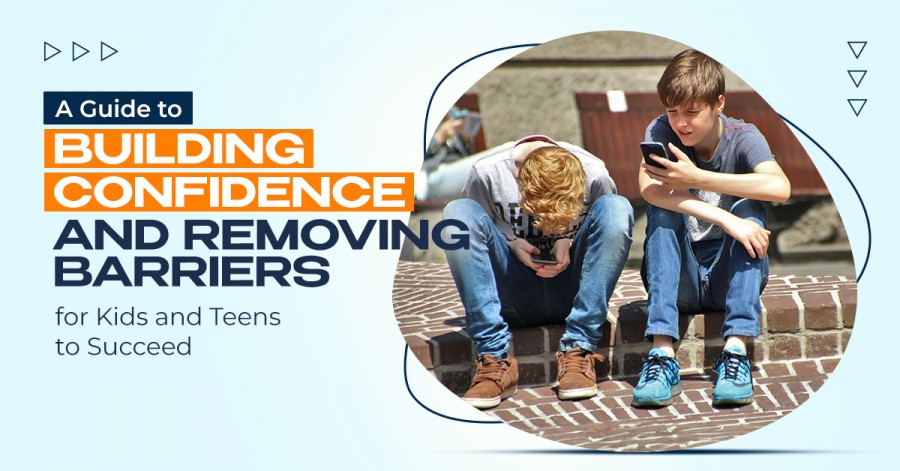A Guide to Building Confidence and Removing Barriers for Kids and Teens to Succeed
Published 07 February 2025 at 12:41
Tickikids Blog Abu Dhabi > A Guide to Building Confidence and Removing Barriers for Kids and Teens to Succeed

Confidence plays a crucial role in a child’s or teen’s development, impacting how they approach challenges, interact with peers, and build their future. However, many young people face barriers that prevent them from believing in their abilities. The good news is that there are proven strategies to help kids and teens build their confidence and overcome these obstacles. By creating a supportive environment, setting realistic goals, and providing opportunities for success, you can help the younger generation navigate their growth with a strong sense of self-belief.
Create a Safe and Supportive Environment
Ensure that your child or teen feels heard, valued, and accepted, both at home and in social situations. When they feel heard, valued, and accepted, it encourages them to take risks and step out of their comfort zones. Creating a safe, supportive environment helps teens feel secure enough to express themselves, which is crucial when considering Addressing Trauma in Teens as part of their overall well-being and confidence-building journey. When kids and teens know they have a strong support system behind them, they’re more likely to approach challenges with resilience and confidence.
- Encourage open communication: Let your child or teen know they can talk to you about anything, whether it's good or bad. Be an active listener, offering empathy and understanding without rushing to judge or solve their problems.
- Show unconditional love and acceptance: Reinforce that you love them for who they are, regardless of their accomplishments or mistakes. Acknowledge their uniqueness and individual strengths, which helps them feel valued and boosts their self-worth.
- Set clear boundaries and expectations: Establishing rules and guidelines provides structure and security, which helps children and teens feel safe. When they know what is expected of them and understand the consequences of their actions, it builds confidence in their ability to navigate their responsibilities.
- Encourage a positive, non-judgmental attitude: Make sure your child or teen knows that mistakes are an opportunity to learn, not something to be ashamed of. Foster an environment where they feel free to try new things without fear of failure or judgment.
Encourage a Growth Mindset
One of the most effective ways to help your child or teen build confidence is by fostering a growth mindset. Teach them that intelligence and abilities are not fixed but can be developed with effort and practice. Celebrate their efforts rather than just their successes. This will help them understand that setbacks are part of the learning process and not an indication of failure. When they embrace the idea that they can improve, they’re more likely to take on challenges with confidence.
- Emphasize the value of effort over innate ability: Remind your child or teen that success is often more about how hard they work than what they’re born with. When they face a difficult task, encourage them to focus on what they can control - their effort, persistence, and willingness to learn.
- Encourage a positive response to mistakes: Help your child or teen understand that mistakes are an important part of learning. Instead of seeing failure as something negative, teach them to view it as a learning opportunity.
- Promote self-reflection and goal setting: Encourage your child or teen to reflect on their progress regularly. Setting both short-term and long-term goals provides a clear sense of direction and accomplishment.
- Create an environment that rewards growth: Surround your child or teen with positive reinforcement that celebrates progress, not just outcomes. Praise the effort, the improvements made, and the steps taken, no matter how small.
Set Realistic and Achievable Goals
Help your child or teen set goals that are both realistic and achievable. When kids and teens have clear objectives, they can measure their progress and experience a sense of accomplishment as they move forward. Break down larger goals into smaller, manageable steps to make them feel more attainable. Achieving these smaller milestones will help build their confidence and motivate them to keep progressing.
- Break down large goals into smaller tasks: Large, intimidating goals can feel overwhelming and discourage action. Break these goals into smaller, more manageable steps to make them feel less daunting.
- Make sure the goals are challenging but not impossible: Goals should push them to stretch their abilities but still be within reach. If the goals are too easy, they won’t feel a sense of achievement.
- Set specific, measurable goals: Goals should be specific and measurable so that progress can be tracked. Instead of saying “I want to get better at math,” encourage them to set a concrete goal like “I will improve my math test score by 10% in the next three months.”
- Review and adjust goals regularly: Life is constantly changing, and so are your child’s or teen’s circumstances. It’s important to regularly review their goals and make adjustments as needed.
Celebrate Success, Big and Small
Take the time to celebrate each success, whether it’s a small step or a significant achievement. This recognition reinforces the idea that effort leads to success. Praise should be specific to the actions they took, not just the outcome. For example, instead of simply saying “Great job,” acknowledge their hard work, such as “You practiced every day, and it paid off!” This kind of feedback shows them that their actions matter.
Acknowledge Effort and Growth
Focus on the effort and growth they’ve shown, not just the result. Recognizing the steps they took to achieve something, like studying hard or persevering through a challenge, builds their self-worth. When kids and teens feel that their hard work is valued, they develop a deeper understanding of what it takes to succeed, and they’re more motivated to continue pushing forward.
Create Meaningful Celebrations
Celebrating success doesn’t always have to be grand. Small, meaningful gestures like a high-five, a special dinner, or a heartfelt note of appreciation can make a lasting impact. These moments of recognition help children and teens internalize the idea that their efforts are worthwhile, boosting their sense of pride and confidence in their abilities.
Encourage Self-Celebration
Teach your child or teen to celebrate their successes. Help them reflect on their achievements and recognize what they did well. Encouraging them to recognize their growth builds their internal confidence, reinforcing the idea that they are capable of achieving their goals independently.
Create Positive Reinforcement Cycles
Regularly celebrating success, big and small, helps establish a cycle of positive reinforcement. When kids and teens see that their efforts lead to recognition and rewards, they’re more likely to keep trying. This ongoing cycle of success and celebration motivates them to take on even bigger challenges, knowing their hard work will be acknowledged and appreciated.
Provide Constructive Feedback
Feedback is essential in helping kids and teens improve and grow. However, the way feedback is given makes a huge difference. Instead of focusing on what they did wrong, offer constructive feedback that guides them toward improvement. Encourage them to view mistakes as learning opportunities rather than failures. By reframing criticism in a positive light, you can help build their resilience and confidence.
Be Specific and Actionable
When offering feedback, be specific about what they did well and what needs improvement. Instead of saying, "You need to work harder," try pointing out areas for improvement with clear steps. For example, you could say, “You did a great job organizing your ideas. To make your argument even stronger, try adding a few more examples to support your point.” This gives them a clear path to follow and avoids leaving them feeling lost or confused.
Offer Encouragement and Support
Feedback should always include a level of encouragement that reassures them they can do better next time. Encourage them by saying something like, “I know this is challenging, but I’m confident you’ll improve with more practice.” This builds their belief in their abilities and motivates them to keep trying, even when things seem tough. Supportive words can make a big difference in maintaining their morale and focus.
Balance Criticism with Positive Reinforcement
Constructive feedback should always balance criticism with positive reinforcement. While it's important to address areas that need improvement, make sure you also highlight what they are doing well. This balance ensures they don’t feel discouraged or overwhelmed by the negative aspects.
Encourage Independence and Responsibility
When kids and teens are allowed to make decisions and take on responsibilities, it can boost their self-esteem. Let them handle tasks on their own, whether it’s managing their homework, taking care of chores, or making decisions about their extracurricular activities. The sense of independence they gain from these experiences helps them build confidence in their ability to handle challenges.
- Allow them to make choices: Giving your child or teen the freedom to make decisions, such as picking their clothes or choosing their extracurricular activities, helps them feel empowered. This autonomy fosters a sense of control over their lives, which in turn strengthens their confidence.
- Encourage problem-solving: Instead of immediately stepping in to solve problems, allow your child or teen to figure out solutions on their own. Whether it's dealing with a difficult homework problem or resolving a conflict with a friend, guiding them through problem-solving steps can help them develop critical thinking skills.
- Assign age-appropriate responsibilities: Giving your child or teen specific responsibilities, like caring for a pet, helping with household chores, or managing their schedule, shows them that you trust them. These responsibilities teach accountability and time management, essential skills for confidence-building.
- Support their mistakes and growth: Let your child or teen take ownership of their successes and failures. When they make mistakes, encourage them to view it as a learning experience rather than a failure.

Image Credit: Pixabay
Help Them Build Positive Relationships
Encourage your child or teen to form positive relationships with peers, mentors, and adults. Social connections play a vital role in confidence-building. When kids and teens feel accepted and understood by others, they’re more likely to feel good about themselves. Help them navigate social challenges and encourage them to surround themselves with supportive individuals who uplift them.
Teach Coping Skills for Stress and Anxiety
Confidence isn’t just about self-belief - it’s also about being able to manage the challenges and stresses that come with life. Teaching coping skills for stress and anxiety can help your child or teen navigate difficult situations with a calm and clear mindset. Encourage practices such as deep breathing, mindfulness, or journaling to help them process their emotions. When they feel equipped to handle challenges, their confidence will grow.
Breathing Techniques
Deep breathing exercises are simple yet powerful tools for managing stress. Encourage your child to practice slow, deep breaths to calm their nervous system when they feel overwhelmed. By focusing on their breath, they can create a moment of pause that helps clear their mind and reduces anxiety, making it easier for them to face challenging situations with clarity.
Mindfulness and Meditation
Mindfulness teaches individuals to stay present in the moment without judgment. You can introduce your child or teen to simple mindfulness exercises, such as paying attention to their surroundings, focusing on their breath, or practicing guided meditation. These techniques allow them to observe their thoughts and emotions without getting overwhelmed, which can significantly reduce stress and improve emotional resilience.
Physical Activity and Relaxation
Physical activity is an excellent stress reliever, as it helps to release built-up tension and improve overall mood. Encourage your child to engage in regular physical activity, whether it’s through sports, walking, or yoga. Additionally, teach them relaxation techniques like progressive muscle relaxation, where they tense and release muscles, to help manage anxiety and promote relaxation.
Foster a Healthy Body and Mind
Physical health and mental well-being are closely connected to confidence. Encourage healthy habits such as regular exercise, proper nutrition, and adequate sleep. Physical activity, in particular, can have a profound impact on a young person’s self-esteem, as it not only improves physical health but also boosts mood and energy levels. A healthy body supports a confident mind.
Balanced Nutrition
Proper nutrition is essential for brain function and emotional stability. A well-balanced diet, rich in vitamins, minerals, and healthy fats, supports cognitive function and can improve focus, memory, and mood. Teaching your child the importance of nourishing their body with healthy foods helps them understand that taking care of their physical health also benefits their mental health and self-confidence.
Adequate Sleep
Sleep is critical for both physical recovery and mental clarity. Lack of sleep can lead to irritability, poor concentration, and low energy, which can all negatively impact a young person’s confidence. Establishing a consistent sleep routine and ensuring they get the recommended amount of sleep will allow them to feel more energized, focused, and ready to tackle challenges with a positive mindset.
Lead by Example
Kids and teens learn by example, so be a role model when it comes to confidence. Demonstrate self-belief and resilience in your actions. Show them how you handle setbacks and challenges positively and constructively. When they see you navigate life with confidence, they’re more likely to adopt similar behaviors themselves.

Image Credit: Unsplash
Building confidence in kids and teens is not a one-time task but a lifelong journey. By providing the right tools, guidance, and support, you can help them develop the self-assurance they need to succeed. Remember that confidence doesn’t come overnight - it’s a gradual process of growth and learning. With patience and encouragement, your child or teen can overcome the barriers that hold them back and move forward with confidence toward their future goals.